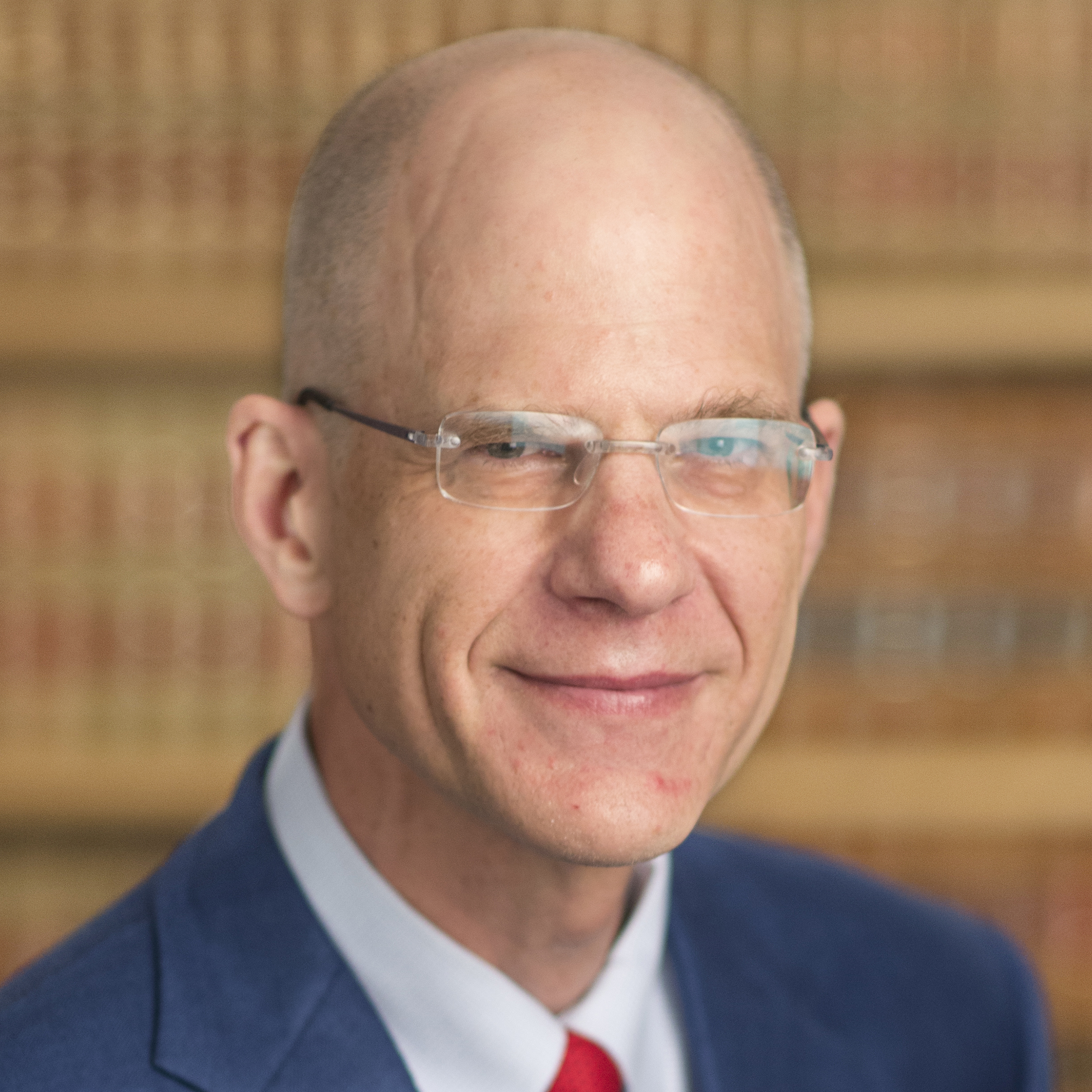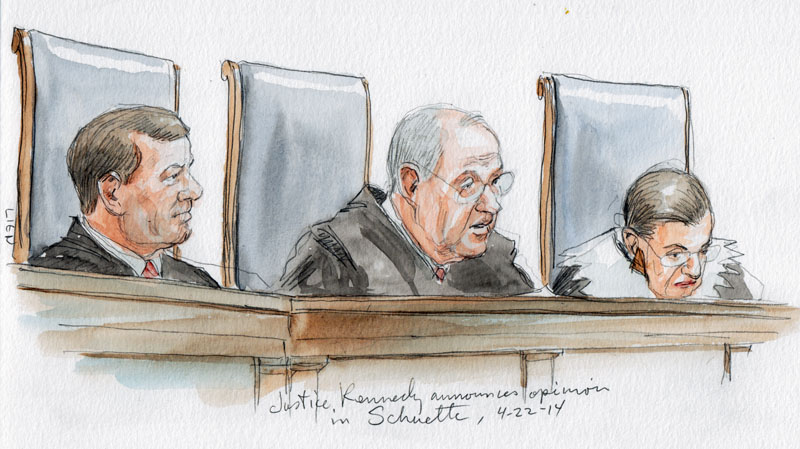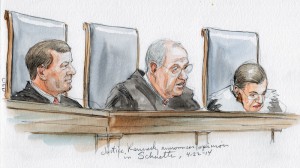Voting rights in Justice Kennedy’s Constitution

on Jul 6, 2018 at 11:52 am

Edward B. Foley is the Charles W. Ebersold and Florence Whitcomb Ebersold Chair in Constitutional Law and the director of Election Law @ Moritz at The Ohio State University Moritz College of Law.
Justice Anthony Kennedy’s jurisprudence on voting rights must be understood in the context of his overall constitutional philosophy. While certainly appreciative of the role that democratic elections play as part of the republican form of government established by the Constitution — see, for example, his concurrences in U.S. Term Limits, Inc. v. Thorton (1996) and Cook v. Gralike (2001) — Kennedy did not view voting rights as having a paramount status within the pantheon of constitutional rights.
Nor did Kennedy consider the protection of voting rights as legitimating the rest of the Constitution. Rather, he saw voting rights as important insofar as they were part of the Constitution. For him, it was the priority of the Constitution itself that gave voting rights their significance. The hierarchy of authority, as he saw it, ran from the Constitution to democracy, not the other way around.

Justice Kennedy in 2014 announces plurality opinion in Schuette v. Coalition to Defend Affirmative Action (Art Lien)
We can see this philosophy at work in Kennedy’s 2013 concurrence in Arizona v. Inter Tribal Council, a case about the pre-emptive effect of congressional regulation under the elections clause of Article I, Section 4. Ordinarily, the Supreme Court hesitates before finding that a federal statute pre-empts state law, and this general hesitation has been doctrinally formalized as a “presumption against pre-emption.” Writing the opinion for the court, however, Justice Antonin Scalia construed the distinctive language of the elections clause concerning the interplay of state and federal power over the “Times, Places, and Manner” of congressional elections to mean that this ordinary presumption against pre-emption does not apply in the specific context of the elections clause. Although Kennedy agreed with the court’s bottom-line finding of pre-emption in the particular case, he balked at Scalia’s characterization of congressional regulation under the elections clause as being any different from commerce clause regulation or the exercise of any other congressional power granted by the Constitution. “There is no sound basis for the Court to rule,” Kennedy argued, “that there exists a hierarchy of federal powers so that some statutes pre-empting state law must be interpreted by different rules than others, all depending on which power Congress has exercised.” The need to protect state sovereignty from unduly expansive pre-emption, he continued, “is the same regardless of the power Congress invokes, whether it is, say, the commerce clause, the war power, the bankruptcy power, or the power to regulate federal elections under Article I, § 4.”
An even more elaborate explanation of the subordinate role that voting rights played in Kennedy’s overall constitutional jurisprudence is found in his 2014 plurality opinion in Schuette v. Coalition to Defend Affirmative Action. That case involved a Michigan constitutional amendment, adopted as a ballot measure, that banned “preferential treatment” on the basis of race. The Michigan measure was challenged as violating the federal equal protection clause, and the court rejected that challenge on the ground that the citizens of Michigan were entitled democratically to choose whether or not they wanted to adopt affirmative action as the state’s public policy. In upholding the “exercise of [the Michigan citizenry’s] democratic power,” Kennedy was careful to cabin this democratic authority within a general account of constitutional rights that prioritized personal freedom over collective self-government:
The freedom secured by the Constitution consists, in one of its essential dimensions, of the right of the individual not to be injured by the unlawful exercise of governmental power. The mandate for segregated schools, a wrongful invasion of the home, or punishing a protester whose views offend others, and scores of other examples teach that individual liberty has constitutional protection, and that liberty’s full extent and meaning may remain yet to be discovered and affirmed. Yet freedom does not stop with individual rights. Our constitutional system embraces, too, the right of citizens to debate so they can learn and decide and then, through the political process, act in concert to try to shape the course of their own times and the course of a nation that must strive always to make freedom ever greater and more secure.
This passage shows clearly that, for Kennedy, freedom comes first and democracy second, and that the purpose of democracy is to preserve and promote personal liberty.
In this respect, Kennedy’s constitutional philosophy is almost exactly opposite to the one articulated most famously by John Hart Ely. In his influential book “Democracy and Distrust,” Ely argued that the court should prioritize the protection of voting rights, so that citizens themselves can decide at the ballot box what personal liberties and freedoms they wish the law to safeguard. Ely argued also that the jurisprudence of the Warren court reflected this “representation-reinforcing” priority for the exercise of the court’s power to invalidate legislation. Whether or not Ely accurately characterized the Warren court’s philosophy, it is evident that the court did not follow this philosophy during the era in which Kennedy effectively controlled the direction of the court as its median justice.
Kennedy’s jurisprudential subordination of voting rights to other constitutional values explains some of his most significant decisions in the area of election law. Citizens United v. Federal Election Commission, for example, which in 2010 recognized the right of corporations to spend unlimited amounts of shareholder equity on electioneering, reflects a libertarian preference for the unfettered freedom of corporations to use their wealth as they wish over the capacity of the electorate to deliberate about how to govern their society. Likewise, Kennedy in 2000 wrote separately in California Democratic Party v. Jones to emphasize the First Amendment right of political parties to control primary elections, even at the expense of an electoral system designed to improve the ability of voters to make choices among the various candidates competing to hold office. Similarly, Kennedy’s crucial fifth vote for the 2013 majority opinion in Shelby County v. Holder, which nullified an historically crucial component of the Voting Rights Act, is best understood as reflecting his view that the power of Congress to protect voting rights is limited by the more fundamental constitutional commitment to federalism, including the proposition that the states themselves have a right to equal treatment by Congress.
Indeed, Kennedy’s most significant voting-rights decisions came in the context of racial discrimination with respect to elections, and these decisions tended to reflect his prioritization of racial equality as a constitutional commitment, rather than a prioritization of the right to vote itself. Emblematic is Rice v. Cayetano, in which Kennedy wrote the court’s opinion invalidating a Hawaii law that permitted only those of Hawaiian ancestry to vote for officials responsible for administering aid programs for native Hawaiians. In reaching this result, Kennedy described the 15th Amendment as entailing a “race neutrality command” more fundamental than the “one person, one vote” principle of the 14th Amendment. His multiple opinions for the court concerning the concept of “racial gerrymandering,” culminating last year in Bethune-Hill v. Virginia State Board of Elections, demonstrate his longstanding desire to purge the political process of improper reliance on race as a basis of legislation.
With respect to partisan gerrymandering, Kennedy famously lacked the surefootedness that he displayed in the adjacent field of racial gerrymandering. This contrast, too, can be traced to his overall constitutional jurisprudence and the subordinate role of democracy in it. Kennedy’s commitment to race neutrality guided him in the race-based redistricting context. But he had no equivalent lodestar for the problem of excessive partisanship in redistricting. He was hoping, as he fervently expressed in 2004 in Vieth v. Jubelirer, that he would find an answer in his overall understanding of how the First Amendment protects freedom of political association. But the answer never came, in large part because the litigants who challenged partisan gerrymandering conceived of it as a defect in the public operation of democracy itself, not as an affront to private First Amendment freedoms. The plaintiffs, including in the recent fizzle of this term’s Gill v. Whitford, were never on the same constitutional wavelength as Kennedy.
A Supreme Court committed to the “representation-reinforcing” philosophy of John Hart Ely would not have struggled with the topic of partisan gerrymandering in the way that Kennedy did. An Ely-influenced court would have ruled partisan gerrymandering an unconstitutional distortion of the democratic process, preventing the electorate from asserting its will as an essential exercise of self-government. The ongoing legitimacy of the Constitution itself, from an Ely-influenced perspective, would necessitate the judicial elimination of excessive partisan gerrymandering as an overriding imperative. But fundamentally Kennedy was not an Ely-influenced jurist, and his inability to solve the problem of partisan gerrymandering — along with the rest of his voting-rights jurisprudence — reflects this most basic fact.


